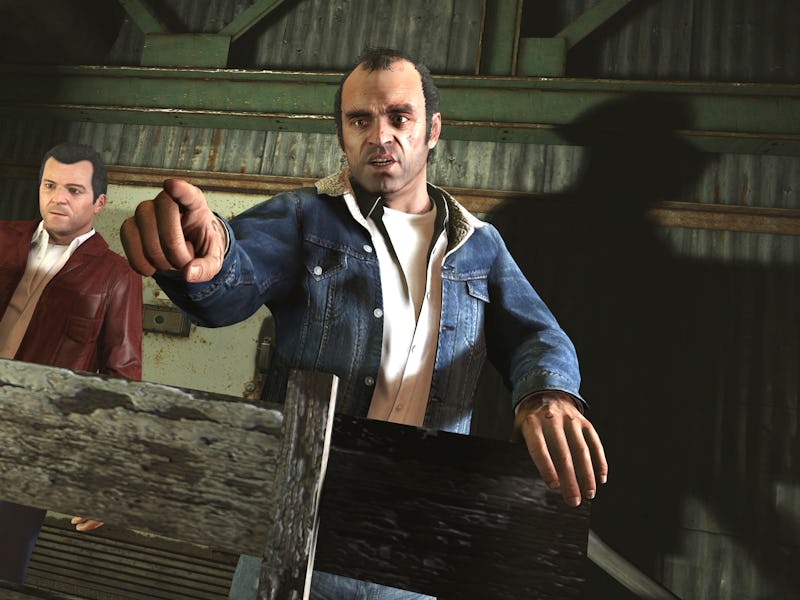Why you can't blame the lack of GTA 6 news on the latest trilogy
Point that finger somewhere else, buddy!

Grand Theft Auto developer Rockstar Games has given us a lot to think about over the past few days. Grand Theft Auto: The Trilogy – The Definitive Edition arrives November 11, bringing three classic GTA titles to current and last-gen platforms. While it may be tempting to have a frustrated knee-jerk reaction to the news (many of us would rather get a GTA 6 update instead, right?) this new collection actually has little to do with the upcoming sequel. If anything, GTA 6 is far more likely to be a victim of current events rather than the development timeline.
Rockstar has little to do with the GTA remaster trilogy
While it’s easy to assume Rockstar Games itself has been hard at work bringing the GTA trilogy to modern hardware with this collection of remasters, it’s important to note that this isn’t the case.
In the Rockstar Newswire post announcing the November 11 release date of Grand Theft Auto: The Trilogy, it was revealed that the project is being helmed by Grove Street Games with Rockstar only assisting as a publishing partner.
There are lots of reasons GTA 6 is taking a long time to finish, but these remasters aren’t one of them.
In other words, the talented folks at Rockstar North who helped to bring us GTA 5 and Red Dead Redemption 2 over the past few years haven’t been impacted at all by the creation of these re-releases. It’s possible the timeline for GTA 6 has been adjusted now that the trilogy exists to satiate that audience, but one game’s development technically isn’t directly harming the other.
Development during the pandemic has proven difficult
If there’s one single factor that has contributed most to the “delay” of GTA 6, it’s that developing triple-A games in the midst of a pandemic has proven increasingly difficult.
Last year, Microsoft Executive VP of Gaming Phil Spencer told Business Insider that projects requiring significant motion capture or audio work were being hit with the biggest delays, and, assuming GTA 6 is expected to arrive in the next two or three years, that’s the exact stage of the creative process Rockstar would likely be working on.
Anyone who’s followed the games industry closely over the past year has seen the results of the pandemic as high-profile titles like Horizon: Forbidden West, Elden Ring, and even the next-gen versions of Cyberpunk 2077 have all been pushed from their respective release dates. The proof is in the pudding that it’s hard to make games from home, and it’s harder to make games in the midst of a pandemic. These realities alone could have shifted the release date of GTA 6 as much as one year removed from where it was previously planned.
Chip shortages are stifling next-gen ambitions
It goes without saying that the transition to the PlayStation 5 and Xbox Series X|S generation has been a bit strained, and that’s mostly because it’s still difficult for consumers to get their hands on a next-gen console even if they have the funds to purchase one. This is the result of a global computer chip shortage brought on by the coronavirus pandemic, and it’s not ending anytime soon.
In late October, Intel CEO Pat Gelsinger told CNBC that he doesn’t expect to see supply-demand parity in the wider technology industry until at least 2023. So, if you’re a developer like Rockstar that’s working on a big game for next-gen hardware, you essentially have two choices: force that complex project onto last-gen hardware and release it earlier, or wait for demand issues to subside to release a single, definitive version of your next big installment.
GTA 6 is likely being held back by the chip shortage, just like Chop on his leash.
At least for now, it looks like Rockstar has elected to take the latter path, but not every game-maker has.
Over the summer, PlayStation Studios shifted from a development house that “believed in generations” to one that has since crafted versions of Spider-Man: Miles Morales, Horizon Forbidden West, and God of War: Ragnarök for both PlayStation 4 and PS5. On the third-party front, games like Battlefield 2042 will feature entirely different versions for PS4 and Xbox One.
But, as fans have seen with titles like Cyberpunk 2077, transitioning an ambitious next-gen game to an older platform doesn’t always pan out well. That fiasco may be precisely what Rockstar aims to avoid by waiting on GTA 6. Similarly, Dragon Age 4, an equally far-off title that could release around the same time as GTA 6, has reportedly opted to be an exclusively next-gen experience. However, if that’s the path a developer takes, then it would have to wait for the hardware to be readily available first.
That’s precisely the holding pattern Rockstar is likely facing with regard to GTA 6. Blame the long wait for GTA 6 on the circumstances of the world, not on a few classic remasters made by an entirely different studio.
This article was originally published on